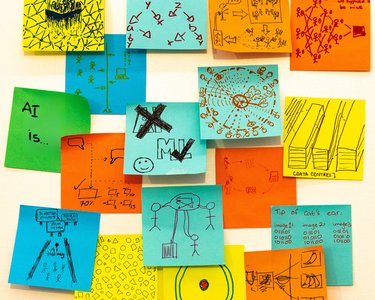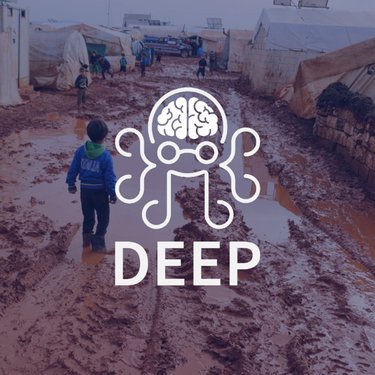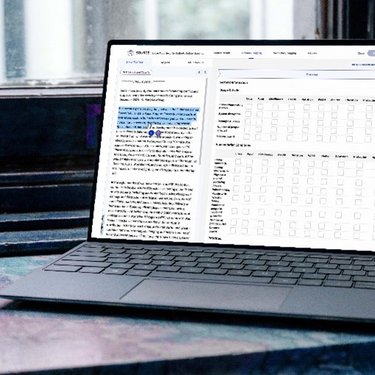
DEEP is a free and open-source platform that empowers humanitarian information managers to quickly make sense of large amounts of unstructured data, and to compile it into structured situation analysis and needs assessments. With the help of AI, it analyses and synthesizes text efficiently, helping humanitarians to make better sense of data to support effective crisis response.
It is one of an ever-increasing number of AI driven products intending to improve the efficiency and effectiveness of humanitarian responses. However, if humanitarians are to make best use of this new technology, we must better understand the wider utility of these tools.
Background
Humanitarians have faced an increasing number of global challenges for years. In any given emergency, relevant information is spread across hundreds of .pdf files, web links, internal documents and so on – all of it unstructured data, which must be analyzed to produce needs assessments, situational reports, and other relevant insights.
In the wake of the Nepal response, a global consortium of innovators envisioned a free, open source, collaborative platform for humanitarians to advance critical qualitative data analyses, and so, DEEP was born.
It was clear to NetHope members that given the increased needs and the scarcity of resources, there had to be a better way to collectively make sense of the data and ensure that information managers
“get the right data to the right people at the right time to make the right decision”.
AI Development
Why AI?
In the middle of a crisis, humanitarians do not have the luxury to go through every datapoint hidden in vast amounts of unstructured data. While initial DEEP instances leveraged a global community of experts for tagging of relevant information, it was clear that Natural Language Processing (NLP) would speed up this process and enable higher quality data retrieval and faster analysis. Once the analysis was done, it was logical to use generative AI to create summaries and reports.
Approach
From the beginning, DEEP’s philosophy was to involve as many parties as possible. The collaborators include nonprofits, UN agencies, the International Federation of the Red Cross and Red Crescent (IFRC), and academic partners. Running a consortium of multiple partners is complex but exciting and critically important for setting a strategic vision. This governance structure has proved to be an important north star for the DEEP consortium. Specifically, the DEEP steering committee puts forth strategic guidance and the technical advisory group co-creates and advances the DEEP roadmap. This innovative governance community includes the Danish Refugee Council (DRC) as the administrative host for the consortium, with Data Friendly Space (DFS) as the implementing partner. Through quarterly meetings, humanitarian actors can give direct feedback on what their needs are, to make sure DEEP is useful and relevant for humanitarians.
DEEP AI and NLP innovations are led by DFS to further the vision of the technical advisory group. DEEP NLP development has followed a user-centric approach where from the concept through deployment, the feedback of users was heard and the features continuously adapted accordingly. More importantly, DEEP is open-source and free to use for anyone; the AI models can be found on Hugging Face.
Functionality
DEEP uses a variety of analytical frameworks (data collection structures) to automatically extract and classify data from unstructured documents (for example, situation reports in .pdf format) and websites (for example, ReliefWeb). Data is automatically annotated (with the option of manual tagging or corrections by the user) and grouped by topic. A generative AI component then produces summaries, analysis, and information gaps documents.
DEEP also provides geospatial tagging from the text it analyses to make its output more accurate to relevant locations. It also automatically creates dashboards and visuals to improve the usability and accessibility of the analysis.
User projects can be set up for a range of use cases. The DEEP platform and DEEP Surge Team have been vital in advancing situational analysis for emergencies, with recent examples including secondary data review and analysis for Ukraine, the Pakistan floods, and the Türkiye and Syria earthquakes. DEEP can also support the protection of vulnerable communities through media monitoring, a feature used by the International Foundation of the Red Cross to monitor the situation of Syrian refugees in Türkiye. The DEEP secondary data review feature supported the Global Information Management, Assessment and Analysis Cell (GIMAC) on COVID-19 joint analysis and monitoring in 7 countries. DEEP also supports operational learning through analyzing past response operations, which is used, for example, by the International Federation of the Red Cross (IFRC).
Whilst DEEP’s analysis is largely automated, the “human in the loop” principle applies – humans should always assess the analysis for any issues or gaps and provide feedback to the model.
Projects can cover specific geographies and be open or closed to other users with different access. Data protection is incredibly important and a cornerstone of the DEEP architecture to advance the foundational humanitarian tenet of “Do No Harm”.
Technology
DFS run the models and store the data securely in the Amazon Web Service (AWS) Cloud. Custom NLP models manage the parsing of pdf documents, tagging and metadata extraction; then generative AI through prompts written by analysts summarizes the analysis and determines information gaps.
Operationalising AI
Today, 7500+ users from 90+ countries use DEEP and over 3200 individual projects have been created on the platform. However, while it caters to a wide range of users; most are employed within the data analysis and information management sectors.
The DEEP team continuously tracks how users are engaging with the system. Training and communication activities are tracked as well. Through the Learning Hub operated by DFS, users can access request assistance, suggest improvements, and access training videos and user guides. DEEP also offers free online courses via the Kaya e-learning platform.
“We want to make sure that users have a strong say in the development of DEEP”, says DEEP Project Manager and former NetHope GIS Manager, Joel Myhre.
User feedback is incorporated into DEEP’s development planning, and the published roadmap shows upcoming changes and enhancements. New functionality is beta-tested by the DEEP team before public release, and the support team communicates new features to users and updates technical guides continuously.
Learnings
Understandably, some humanitarians are still hesitant to use AI tools in their context. The DEEP team addresses this through continuously improving the accuracy of DEEP based on user feedback, to keep building trust in the accuracy of the analysis.
To best support and connect all humanitarian actors across all geographies, the DEEP’s free and open-source foundational tenets advance accessibility and localization globally. Institutional and data governance are vital to ensure both broad stakeholder engagement, feedback, and advancing the key data-driven humanitarian mantra of “Do No Harm”, and it enables the long-term sustainability and growth of the platform.
Plans for the future
DEEP is constantly evolving. A new application within DEEP will be the Joint Analysis Workspace (JAWS), which will integrate qualitative and quantitative data from different sources and allow users to provide expert input to close any gaps in the analysis. JAWS is aimed at large-scale coordination between many organizations, with one common analytical framework.
Increased localization through addition of languages and relevant content is on the roadmap for the overall platform, as is exploring the use of generative AI for translation.
Joel Myhre says on DEEP’s future: “The team plans to continue the growth of the DEEP user base and global network, through strategic partnerships and technical collaborations with a keen eye towards localization and inclusion. Via the JAWS interoperability collaborations with the UN’s Global Information Management Working Group (IMWG), the aim is to collaborate with other platforms and data repositories through integration of information and data, and co-development of additional functionality. The DEEP Secretariat, Governance Board, and global community of stakeholders welcomes further partnerships to advance and sustain our important free and open-source NLP innovations via resource mobilization and capacity building as the sky is the limit for DEEP and JAWS.”
Learn more
Joel Myhre, DEEP project manager, joel.myhre@drc.ngo and pm@thedeep.io
Visit the DEEP website


You might also be interested in…

